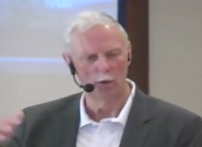Finding Hope in the Dark Politics of Environmental Destruction (Rev. Lou Snead)
At the national level today, the priorities and concerns of environmentalists like me have been taking a beating. This assault on environmental policies began with President Trump's election promise to bring coal back as an energy source. He followed this up by appointing climate change skeptics and deniers as the directors of the EPA and the Energy Department.
In just a few months, federal environmental regulations to reduce green-house emissions and protect natural resources were relaxed or eliminated.
Since the beginning of this year there has been nothing but bad news with regard to making progress in mitigating against the negative planetary impacts of human activity. Even more discouraging is the “win/lose” power approach that both our national and state political leaders remain wedded to around highly polarized issues. Finding common ground and working toward the public good of all seems to have gotten lost in today's ideological warfare.
So, what will keep progressive environmentalists from losing hope in our efforts to protect the health of our planet and the future well-being of humanity? Some of us think this is a macro issue that will require a sufficient number of voters to elect leaders who care about the environment as we do. Others of us look for environmental causes and advocates to support in hopes that they will embody the influence needed to push back on the kind of environmental destruction we see going on now. Many of us just seek out cloisters of like-mined environmentalists with whom we can share our frustrations and disillusionment with what is taking place at the national or state levels. But, there are several channels of encouragement, beyond participating in what often feels like environmentalist group therapy, with regard to turning the tide of environmental destruction.
First of all, we can find some hope in the ability of people in this country to pay attention to science and understand the dynamics of climate change and global warming. It has been a slow process amid the merchants of doubt, but a Yale University survey has discovered a steady increase over the past 10 years in the number of Americans who have reached the conclusion that global warming is taking place and human activity is the biggest factor. Even in the face of the dismantling of national and state environmental policies, we can find national, state, and local efforts going on to mitigate against environmental peril, if not for all the reasons we might think are right. One source of hope is the slow but steady work of the Citizens Climate Lobby to bring together congressional leaders and local communities to take an economic approach to reducing our dependency on fossil fuels via a carbon fee dividend. Another bright spot is the continuing growth of renewable energy sources and the public embrace of green energy for both home and transportation. In short, linking together environmental and economic benefits has great appeal to consumer Americans.
In actuality, it has been our local efforts to combine economic savings with environmental stewardship measures that gives me the most hope. While my local community is nowhere near being dominated by green-thinking people, our City's municipal utility has received national attention when it made the purely economic decision to utilize 100% renewable energy sources. This switch to wind and solar power occurred because our local utility found that these two energy sources here in Texas provided to cheapest electricity rates for its customers. Now our City utility is exploring the idea of turning our entire town into a “virtual power plant” by renting optimal residential and commercial rooftops for the installation of municipally owned solar systems. Because of these cost savings, customers in this conservative part of Texas are now hoping that battery storage technology will advance enough to get our entire community off the electric grid. This local appreciation for renewable energy has grown up around the economic benefits to homeowners who were not motivated by environment concerns at all.
Local efforts also provide some of the greatest hope for me. For instance, when I recently installed solar panels on my home at least seven other neighbors on my street inquired about the long-term cost saving from investing in a rooftop solar system. I wrote up a summary of my experience investigating solar systems, vetting vendors, calculating costs, etc. and gave it to them. Here in the past four months, four of these neighbors have now installed a solar system on their home simply to reap the long-term cost benefits. And all of us are older, retired people who may not live long enough to maximize all the energy savings now available to us. When you can easily convince conservative, money-conscious, seniors of the economic benefits of an environmental resource there is great reason for hope. The same is true in terms of water conservation. Now that we are experiencing another summer drought here in Texas it's amazing how many folks around here are now interested in putting moisture sensors in their landscaping to save money on irrigating our lawns and trees.
It may be sad to say that economic benefits speak much louder than environmental concerns for many Americans. New York City and Miami may have to be underwater before some folks realize or admit that human activity is creating colossal climate disruption and displacements. But these trends toward utilizing renewal energy and conserving resources provide some shining points of light in an otherwise dim political climate that seems hell-bent of environmental destruction. So, I'm hopeful that economics will ultimately carry the day for us to do the right thing in terms of environmental stewardship practices. Once again, we must continue to think global and work local.
-- Rev. Lou Snead
Georgetown, Texas
###
Rev. Lou Snead is a retired Presbyterian pastor living in Central Texas. Here is recent video of his work with his local utility.







